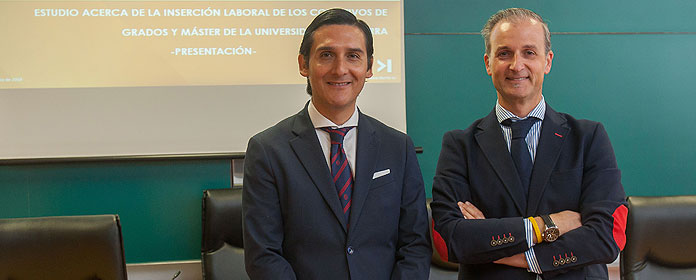92.5% of university graduates are working or continuing their studies
The director of Career Services at the academic center highlights five keys that help in finding employment

92.5% of 2015, 2016 and 2017 graduates from the University of Navarra are working or furthering their education, according to the study on labor market insertion conducted by the Institute for Market Research and Strategic Marketing, Ikerfel.
This is the fourth consecutive year in which the number of employed graduates has increased, which in the previous edition showed an employment rate of 91.6%. There was also an increase in the number of respondents whose current employment is related to their studies (from 89.2% to 90.9%). The alumni also emphasized that their employment is considered to be of "fairly good quality".
The report reveals that "graduates who are working have found their first job relatively soon after completing their degree," it notes. Sixty.5% took less than six months, and 48.9% took less than three months; not to mention that 10.9% were already working" when they completed their studies.
These data are influenced by the high level of internships in companies and institutions, since 81.2% of those surveyed said they had done them during their university studies, in order to learn about the labor market, apply the knowledge acquired and present a better candidacy when looking for a job.
Likewise, Ikerfel points out that the alumni of the last three courses have an average net monthly salary of 1,352.5€ and a relatively quick access to the labor market. They work in a wide range of sectors, among which Hospitals, Public Health Centers (12.6%) and Education and Research (12.4%) stand out; companies that are mainly located at national level (58.5%).
Navarra (30.8%), Madrid (24.7%) and the Basque Country (19.2%) are the communities where most of the graduates of the University of Navarra work, an institution that has assumed a prominent and growing role in the labor market insertion of students, since it has become the means through which most of them gained access to their first job.
They value their current employmentUniversity of Navarra graduates rated their current job with an average score of 8.10 points out of 10, and positively emphasized the relationship with colleagues (8.90), with bosses and managers (8.51) and the type of task performed (8.16), in addition to the level of autonomy and responsibility. On the other hand, they gave lower ratings to remuneration (6.96) and promotion opportunities (7.46).
The research reveals "an important perception of adequacy of the training received in relation to the current job", since 74.6% of the graduates consider that the current job matches their qualifications in terms of the training received and the academic training that was demanded of them (73%).
On the other hand, 22.5% of graduates found a job through Career Services -the career services department of the University of Navarra-, and 47.5% of users of the academic center's job portal said that this platform is useful for accessing internships and finding employment, thus confirming the University's strengthened commitment to the transfer of talent to society.
Five keys to employmentThe director of Career Services University of Navarra, Roberto Cabezas, explained, during the presentation, some of the keys that help to find a job in line with the interests of candidates. He stressed the importance of building a personal brand, because "digital identity helps us to narrate our life and our professional interests; it is an ally, our reflection. We have to be on the network to strengthen our brand".
He also included among the five main keys the fluency in a third language, chosen according to the sector; knowing oneself and trusting in one's abilities, "it is necessary to know what we are good at and what excites us, because the answer will bring us closer to a professional project that we will develop with the passion that we give to our hobbies," said Roberto Cabezas.
Hobbies were the fourth point: "They are revealing of your personality, as well as the competencies and skills in which you excel. It's a way for employers to get to know you in what you're passionate about."
Finally, the director of Career Services detailed that the CV requires careful work: "Sometimes not enough attention is paid to it, but you have to take into account that employers spend an average of 6 seconds on each one. You have to be able to 'tell us' with the best precision".
